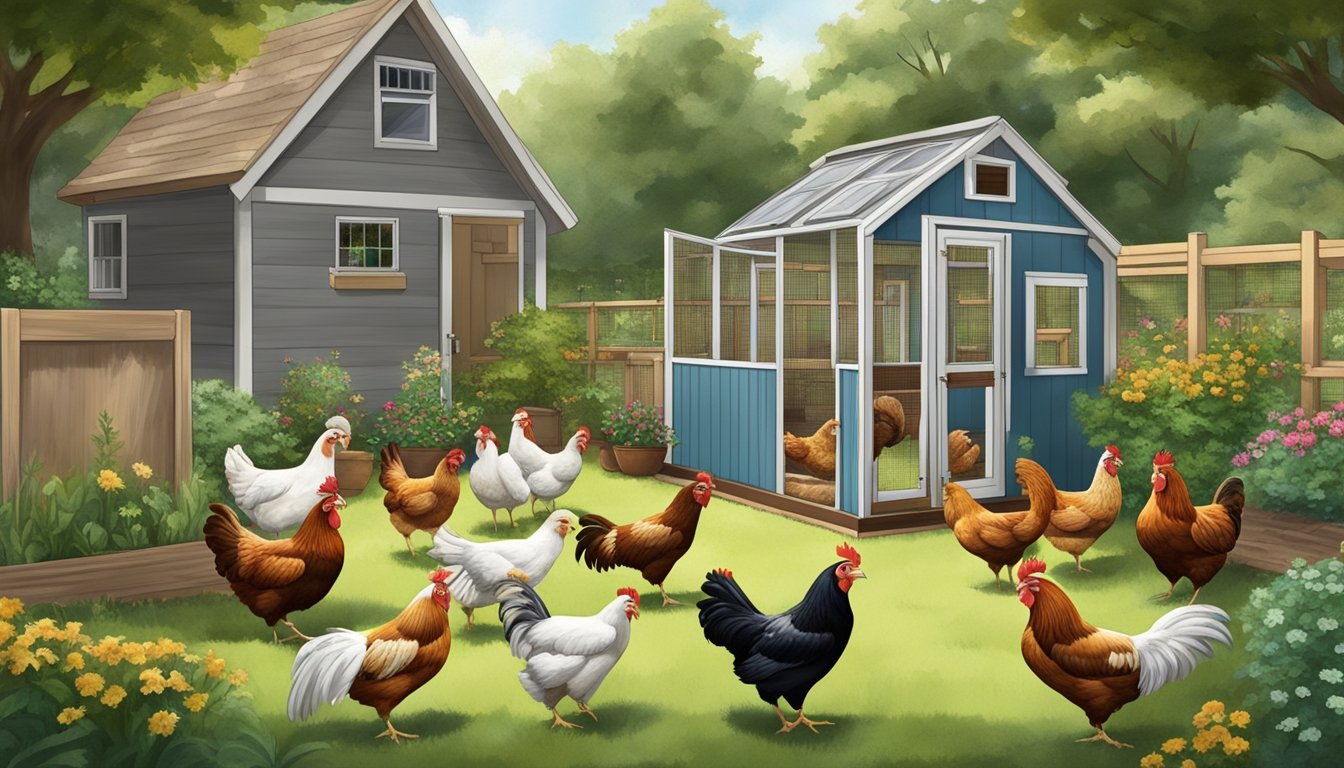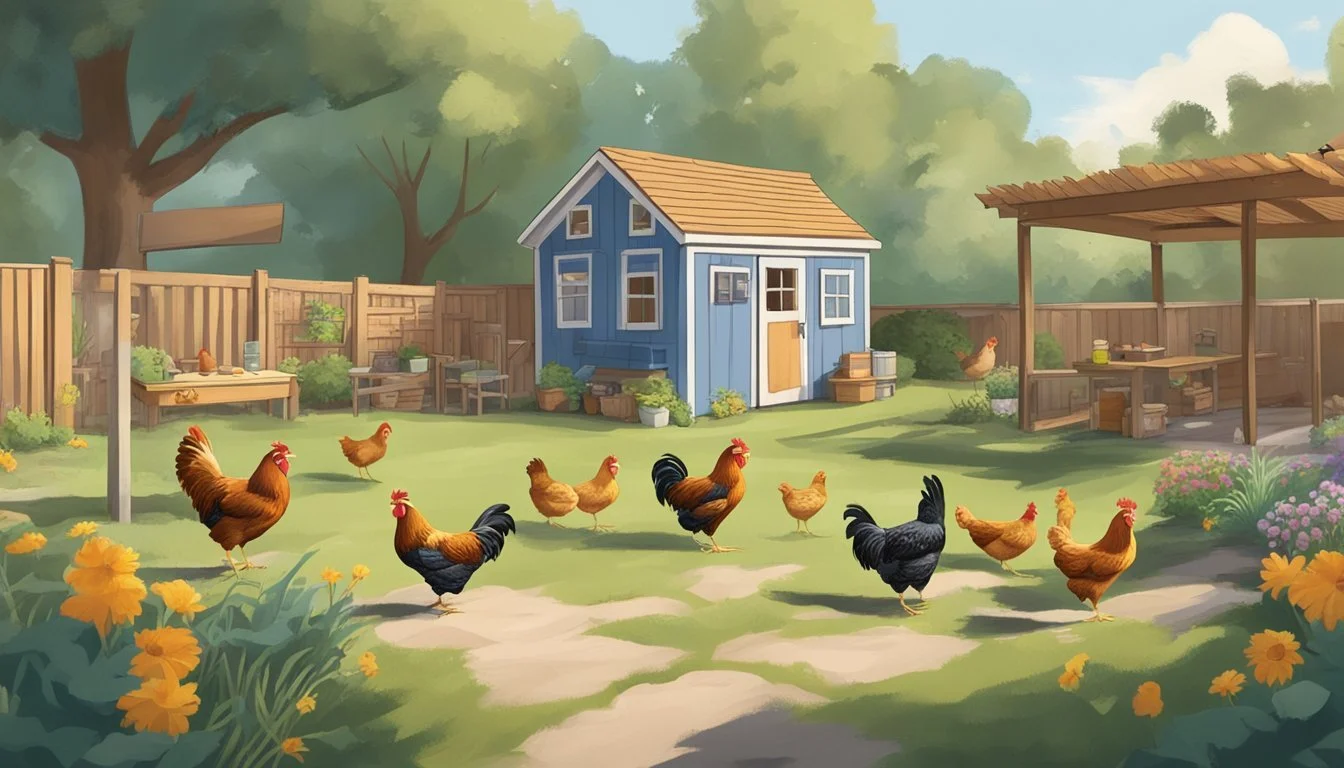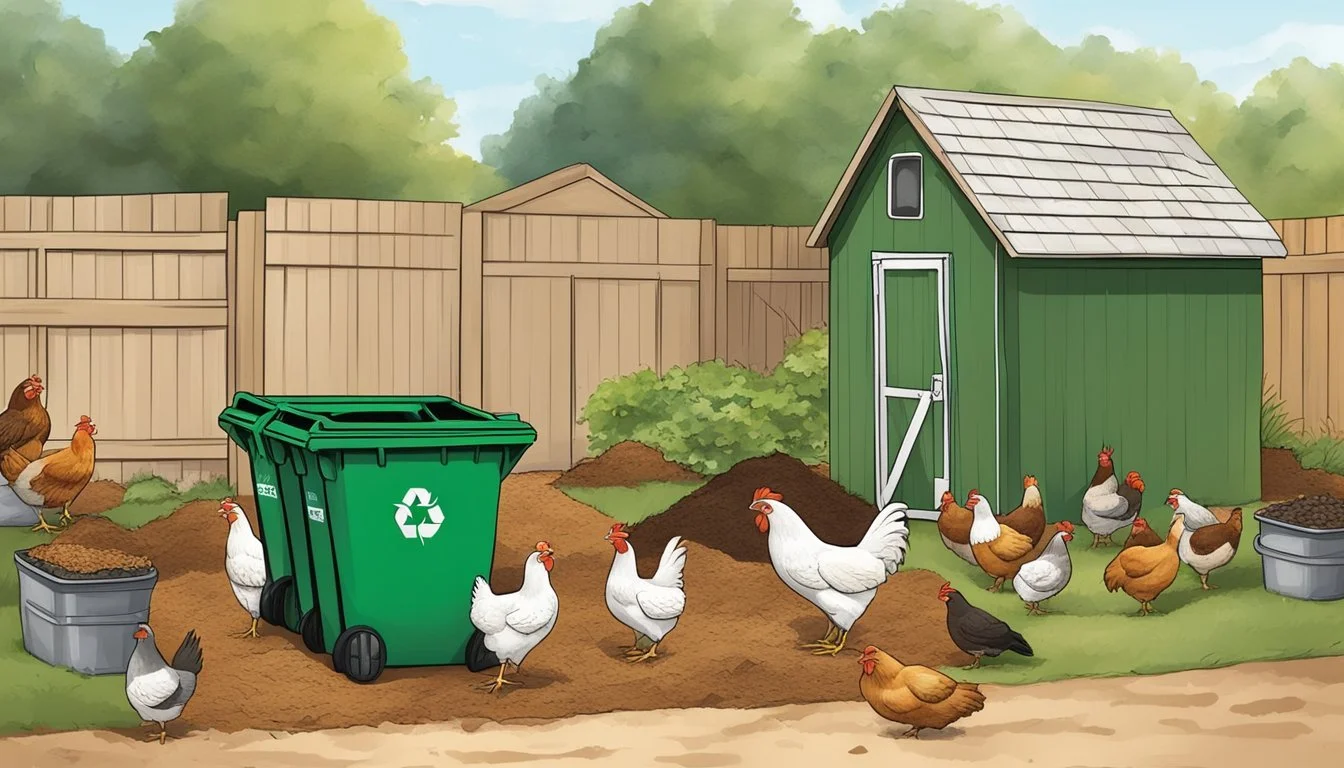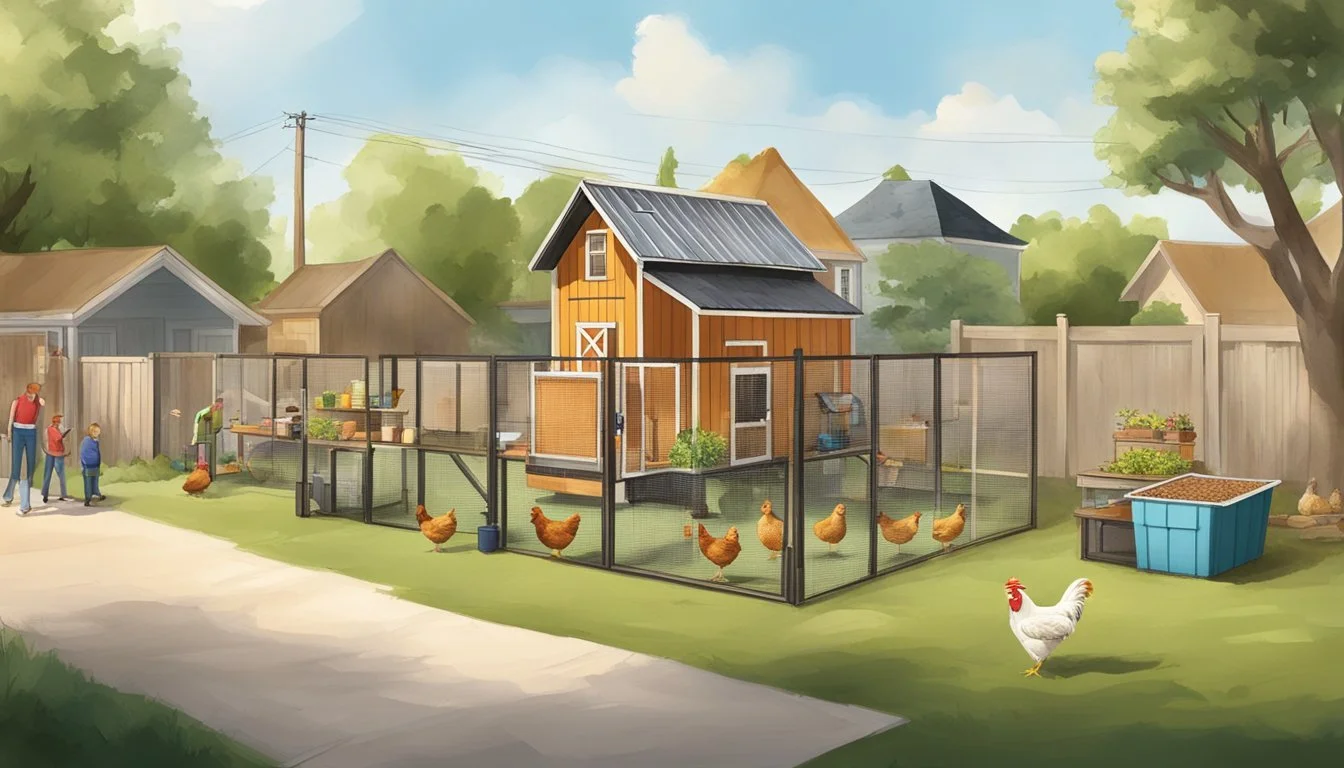Keeping Backyard Chickens in McKinney, TX
Essential Tips for Beginners
In McKinney, Texas, the growing trend of urban agriculture includes the practice of keeping backyard chickens, which has become popular among residents seeking a more sustainable lifestyle. The city acknowledges this inclination toward self-sufficiency and allows the keeping of backyard hens within its city limits, with specific regulations in place to ensure the welfare of the animals and the community. Residents are permitted to have up to 12 hens in their backyard, providing they are housed within an appropriate enclosure, which aligns with the community's commitment to balancing urban living with a touch of rural tradition.
However, it is important to note that while hens are allowed, the keeping of roosters is strictly prohibited in McKinney to minimize noise concerns. Furthermore, individual housing requirements may vary depending on the specific circumstances of a resident's property, underlining the importance of familiarizing oneself with local ordinances. The city's rules aim to facilitate the harmonious integration of chicken-keeping into residential life, preventing any potential nuisances and promoting good neighborly relations.
The trend towards backyard chickens in McKinney reflects a broader movement across Texas, where many cities have created guidelines to accommodate residents' interest in urban farming. As always, it is recommended for residents to thoroughly review the most current city ordinances or seek guidance from municipal resources to ensure they remain compliant with local laws when starting or maintaining their backyard flock.
Understanding Local Ordinances
When considering raising backyard chickens in McKinney, TX, residents must navigate a patchwork of local ordinances and homeowners' association (HOA) rules that govern the practice.
McKinney and Texas City Regulations
In McKinney, city ordinances dictate specific guidelines for keeping chickens. It is important for prospective chicken owners to understand that while the city allows for the keeping of chickens, there can be specific requirements related to the distance of chicken coops from neighboring residences. For example, certain city ordinances may require chicken coops to be at least 150 feet from any residence, which can restrict the ability to keep chickens on smaller properties or in more densely populated areas.
The laws and regulations can vary not only from one Texas city to another but sometimes even within different areas of the same city. These regulations can cover various aspects, from coop construction to the number of chickens allowed. To avoid penalties, individuals need to read through the relevant sections of the McKinney Code of Ordinances carefully or consult with local authorities to ensure compliance.
HOA Guidelines and City Ordinances
Residents must also be aware of any HOA guidelines that might impact their ability to keep chickens. These guidelines can be more restrictive than city ordinances and are legally enforceable within the jurisdiction of the respective homeowners' association.
It is common for HOAs to address topics such as:
The type of animals allowed
Restrictions on animal housing structures
Maintenance and noise regulations
Before purchasing or building a coop, chicken owners should review their HOA's covenants, conditions, and restrictions (CC&Rs) to verify that they can indeed keep chickens on their property and under what conditions. In some instances, the HOA might have specific requirements or bans that surpass the city's regulations, effectively overruling city ordinances concerning backyard chickens.
Engaging with local city, and HOA boards can provide clarity and aid in ensuring that all laws and regulations regarding keeping backyard chickens in McKinney, TX, are met.
Setting Up Your Chicken Coop
When setting up a chicken coop in McKinney, TX, residents must consider both city ordinances and the practical aspects of coop design to ensure the well-being of their backyard chickens. Safety from predators and the Texas weather should be pivotal to the coop's design and location.
Coop Design and Location
The design and location of a chicken coop are critical for keeping chickens healthy and comfortable. McKinney's city ordinances might mandate specific distances from residences, so it is essential to verify local regulations before erecting a coop. As a rule, each chicken requires 2-3 square feet inside the coop and 8-10 square feet outside for roaming. The coop should be raised to prevent dampness and provide shade to protect from the Texas heat.
Optimal Coop Features
Raised floor for dryness and air circulation
Ample space for natural behaviors
Protected from extreme temperatures
Compliant with local regulations
Safety from Predators and Weather
A coop must be fortified to keep chickens safe from common Texas predators like raccoons and hawks. This involves using hardware cloth instead of chicken wire, as the latter is easily breached. Additionally, secure latches on doors and vented windows are crucial because raccoons can manipulate simple locks. Coops should also be designed to withstand weather, considering Texas can face storms.
Predator and Weather-proofing
Enclosure: Use hardware cloth buried underground
Latches: Install predator-proof locks and latches
Weather: Ensure the coop is sturdy to handle heavy weather
By focusing on a robust design that considers both security and local laws, one can create a suitable home for backyard chickens in McKinney, TX.
Breed Selection and Chicken Care
Choosing the right breeds and providing proper care are critical aspects of successfully raising backyard chickens in McKinney, TX. This section will guide you through selecting suitable chicken breeds for your backyard, as well as maintaining their diet, health, and social needs.
Choosing the Right Chicken Breeds
When selecting chicken breeds for McKinney, TX, consider local climate, space limitations, and your intended use for the chickens. Heavy breeds like Brahmas are calm and perform well in cooler temperatures, making them a suitable choice for the variable Texas weather. For egg production, Leghorns are prolific layers, while Orpingtons are well-rounded hens suitable for both meat and eggs. Remember to comply with local ordinances which may limit the number of hens and prohibit roosters, curbing noise and fowl aggression.
Feeding and Health Maintenance
Chickens require a balanced diet consisting of a commercial poultry feed, supplemented with grains, vegetables, and occasional protein like mealworms. It is essential to provide continuous access to clean water. To prevent disease, maintain a clean coop, regular health checks, and ensure vaccinations if recommended by a veterinarian. Monitor for signs of common ailments such as respiratory issues or mites.
Exercise and Social Needs
Chickens are social animals that require space for exercise and interaction. A secure, fenced area allows them to forage, which is integral for their physical health and mental well-being. Provide perches and nesting boxes to support their natural behaviors. Hens will establish a pecking order; observing this hierarchy can help in managing their social environment. Avoid overcrowding, which can lead to stress and aggression.
Legal and Ethical Considerations
When keeping backyard chickens in McKinney, TX, residents must adhere to city regulations and maintain good relationships with their neighbors. It is crucial that owners understand and comply with pertinent laws to avoid fines and penalties while also considering the impact their activities have on the surrounding community.
Compliance with Local Laws
McKinney's local laws allow residents to keep up to 12 hens, but roosters are prohibited within city limits, aimed at minimizing noise disruptions. The laws mandate that hens must be maintained in a proper enclosure. Failing to meet these regulations may result in penalties. Therefore, it is important for residents to review the specific details of local ordinances to ensure compliance.
For instance, other fowl species may also be subject to prohibition, and potential restrictions could be placed on the proximity of chicken enclosures to neighboring residences, which is a common consideration in city ordinances. Residents should consult the City of McKinney's official documents or contact local authorities to clarify any specific distance requirements and to obtain necessary permits if applicable.
Responsibilities to Neighbors and Community
Residents must be considerate of their community when keeping backyard chickens. This involves:
Ensuring enclosures are well-maintained to prevent odors and pests.
Keeping noise to a minimum, which is part of the reason for the rooster ban.
Being mindful of the placement of chicken coops in relation to neighbor's property to respect privacy and local residential regulations.
Maintaining a harmonious relationship with neighbors can help prevent disputes, which could result in complaints leading to legal action or fines. Ethically, it's imperative for residents to manage their poultry responsibly, balancing their rights as owners with the rights of their community to a peaceful, clean, and orderly environment.
Managing Waste and Sanitation
Proper waste management is crucial for backyard chicken keepers in McKinney, TX, not just for cleanliness, but also to comply with local ordinances and maintain community health standards.
Effective Waste Management Strategies
Chicken owners should develop routine cleaning schedules to ensure waste is handled responsibly. This includes daily removal of droppings and refreshing bedding material. Composting chicken manure is an effective strategy for waste management. This process involves layering carbon-rich materials (leaves, straw) with chicken waste in a compost bin and allows it to decompose. The resulting compost can be used to enrich garden soil.
Regular Cleaning: Establish daily and weekly cleaning routines.
Daily: Scoop and dispose of droppings.
Weekly: Change out bedding materials.
Composting:
Combine manure with carbon-rich materials in a compost bin.
Allow the mixture to decompose and become part of garden compost.
To further mitigate sanitation issues, McKinney residents must adhere to the local "pooper scooper" law, which mandates the prompt removal of pet waste. Non-compliance can lead to citations, underlining the importance of staying diligent with sanitation practices. Additionally, well-designed waste management systems can prevent disease and promote the health of both the chickens and the broader community.
Eggs and Productivity
When raising backyard chickens in McKinney, TX, understanding and optimizing the egg-laying process are crucial for productivity. The breed of chickens chosen can affect the number of eggs produced, with hens typically beginning to lay eggs at five to six months of age.
Maximizing Egg Production
To maximize egg production, one needs to provide chickens with a conducive environment and proper care. A balanced diet, clean water, and adequate coop space can lead to healthier hens and thus, a higher egg yield. On average, a well-cared-for hen can lay up to 250 eggs annually. Optimal daylight exposure of 14 to 16 hours can stimulate egg laying. For detailed care, consider the following:
Diet: Layer feed, rich in calcium and protein
Hydration: Consistent access to clean water
Space: Minimum of 4 square feet per chicken in the coop
Security and health care practices are also vital, as stress from predators or illness can significantly decrease egg production.
Handling and Selling Eggs
When selling eggs, hygiene and compliance with local ordinances are imperative. Collect eggs frequently to ensure cleanliness and reduce breakage. Store eggs at a consistent and cool temperature to maintain freshness. One must obtain necessary permits before any sale. McKinney, TX residents should adhere to specific city regulations, which may include:
Proper labeling with sell-by dates and safe handling instructions
Ensuring eggs are free from contaminants
Before considering sales, it is recommended to consult city ordinances and obtain any required permits to ensure full compliance with local laws.
Advanced Topics in Poultry Keeping
When diving into advanced poultry keeping, enthusiasts in McKinney, TX should consider the intricacies of breeding and the local regulations governing livestock. Mastery in these areas ensures a thriving, compliant poultry environment.
Breeding and Raising Livestock
Breeding backyard chickens is a detailed venture, involving knowledge of genetics, brooding, and the lifecycle of poultry. Successful breeding requires:
Understanding Genetics: Different traits like feather color, egg production, and temperament are inheritable.
Brooding: A dedicated space that is warm and safe is essential for raising chicks.
Lifecycle Management: Accurate records of each bird’s lineage, health, and productivity should be maintained.
Raising other types of fowl such as geese, turkeys, and guineas, or animals like rabbits, also falls under this domain. Each species has unique needs:
Space: Geese need extensive grazing area and water access.
Nutrition: Turkeys require a high-protein diet to develop properly.
Predator Management: Proper fencing and shelter protect against common predators.
Navigating Permits and Legal Requirements
In McKinney, one must be aware of zoning laws and city ordinances that affect the keeping of poultry and livestock. McKinney's ordinance states that:
Distance Requirements: Structures housing chickens must comply with specific setback distances from neighboring residences.
Quantity Limits: There may be limits on the number of animals based on the size of the property.
Here is a quick reference for some common livestock and their relevant McKinney, TX regulations:
Livestock Specific Regulation Note Horses, mules Often require more land due to size and grazing needs. Hogs May be restricted in urban areas due to space and sanitation concerns. Sheep, goats Fencing and shelter regulations apply to protect the animals and prevent them from becoming a nuisance. Fowl Chickens, ducks, and similar fowl often fall under specific small livestock ordinances separate from larger animals.
For detailed and up-to-date requirements, one must review the McKinney city ordinances and possibly engage with the permitting process. It is essential to follow these legal frameworks to avoid penalties and ensure the welfare of the animals.
Community and Educational Resources
McKinney, Texas, offers a variety of educational resources for residents interested in keeping backyard chickens. These resources provide opportunities for learning and engagement with local experts and community enthusiasts.
Learning from Local Experts
In McKinney, residents can tap into the wealth of knowledge possessed by experienced local chicken keepers. The McKinney Tour de Coop is a notable annual event where participants can learn directly from seasoned urban chicken coop owners. This event not only showcases different coop styles and management techniques










